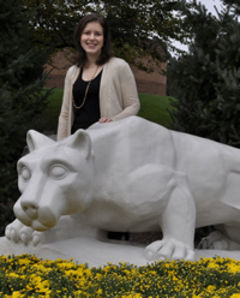Media, PA 19063
Biography
Jennifer M. Zosh, Ph.D., is a Professor of Human Development and Family Studies at Penn State University’s Brandywine campus where she received the Distinguished Teaching Award (twice). As the Director of the Brandywine Child Development Lab, she studies how infants and young children learn about the world around. Her areas of expertise and publication include playful learning, the impact of technology on children, working memory, mathematical cognition, and language acquisition. Notably, she was a co-lead author on a recent (2015) publication in Psychological Science in the Public Interest about putting education back in educational apps through the application of research in the science of how children learn. She presents her work at professional meetings including: the Society for Research in Child Development, International Congress on Infant Studies, National Academy of Sciences Children and Screens colloquium, International Mind Brain and Education Society, and others.
A major driving force in her career is dissemination and translation of scientific discoveries to the public via blogging and media appearances. This translational work has appeared on The Conversation, PBS Parents, The Huffington Post, the Brookings Institution, the Joan Ganz Cooney Center, NPR Radio Times, Fox29 news, and beyond. She is also involved in the dissemination of developmental research through her involvement with Living Laboratories embedded in children’s museums and her roles on advisory boards for organizations (e.g., Ultimate Block Party, Urban ThinkScape). She graduated Summa Cum Laude from the University of Delaware with a B.A. in Psychology and a minor in Cognitive Science. She received her Ph.D. in Psychological and Brain Sciences from Johns Hopkins University.
Dr. Zosh’s undergraduate research experience profoundly changed her view of college education and she seeks to actively involve undergraduates in her research. Undergraduates working with Dr. Zosh will have a hands-on research experience in which they are actively involved in the recruitment and running of subjects and the analysis of data. Undergraduates working with Dr. Zosh are expected to take ownership of the projects they are working on and may be responsible for presenting their work during lab meetings. They will also be expected to read and discuss applicable articles (with Dr. Zosh’s help!). Overall, she wants to give undergraduates the opportunity to see new knowledge being generated and to have an active role in the scientific process.
When she is not in the lab or teaching courses in infancy and child development, she is an avid cook and amateur photographer.
Recent Publications
Zosh, J.M, Hirsh-Pasek, K., Golinkoff, R.M., & Dore, R.A. (2017). Where learning meets creativity: The promise of guided play. In. R. Beghetto & B. Sriraman (Eds.). Creative contradictions in education: Cross disciplinary paradoxes and perspectives (pp. 165-180). New York, NY: Springer International Publishing.
Zosh, J.M., Hirsh-Pasek, K., Golinkoff, R.M., & Parish-Morris, J. (2016). Learning in the digital age: Putting education back in educational apps for young children. In Encyclopedia on Early Childhood Development. Retrieved from: http://www.child-encyclopedia.com/technology-early-childhood-education/…
Zosh, J. M., Hassinger-Das, B., Toub, T. S., Hirsh-Pasek, K., & Golinkoff, R. (2016). Playing with mathematics: How play supports learning and the Common Core state standards. Journal of Mathematics Education at Teachers College, 7, 45–49.
Zosh, J.M., Verdine, B., Fillipowitz, A. Golinkoff, R.M., Hirsh-Pasek, K., & Newcombe, N. (2015). Talking shape: Parental language with electronic vs. traditional shape sorters. Mind, Brain, and Education, 9, 136-144.
Hirsh-Pasek, K.*, Zosh, J.M.* (*joint first authors), Golinkoff, R., Gray, J., Robb, M., & Kaufman, J. (2015). Putting education in “educational” apps: Lessons from the Science of Learning. Psychological Science in the Public Interest, 16, 3-34.
Zosh, J.M. & Feigenson, L. (2015). Array heterogeneity prevents catastrophic forgetting in infants. Cognition, 136, 365-380.
